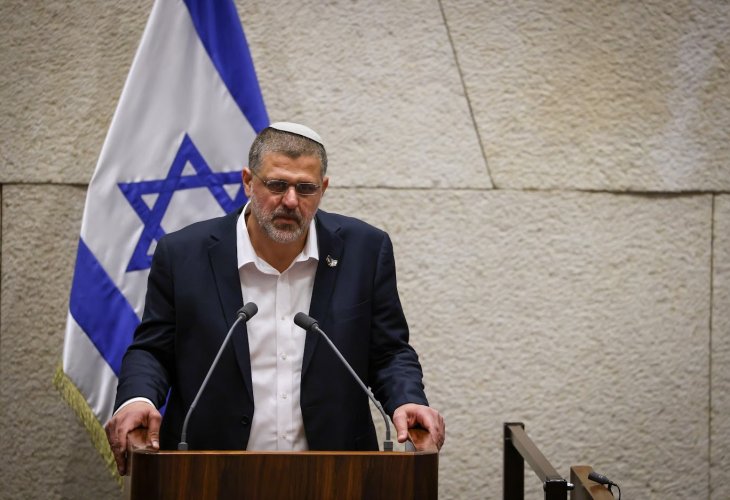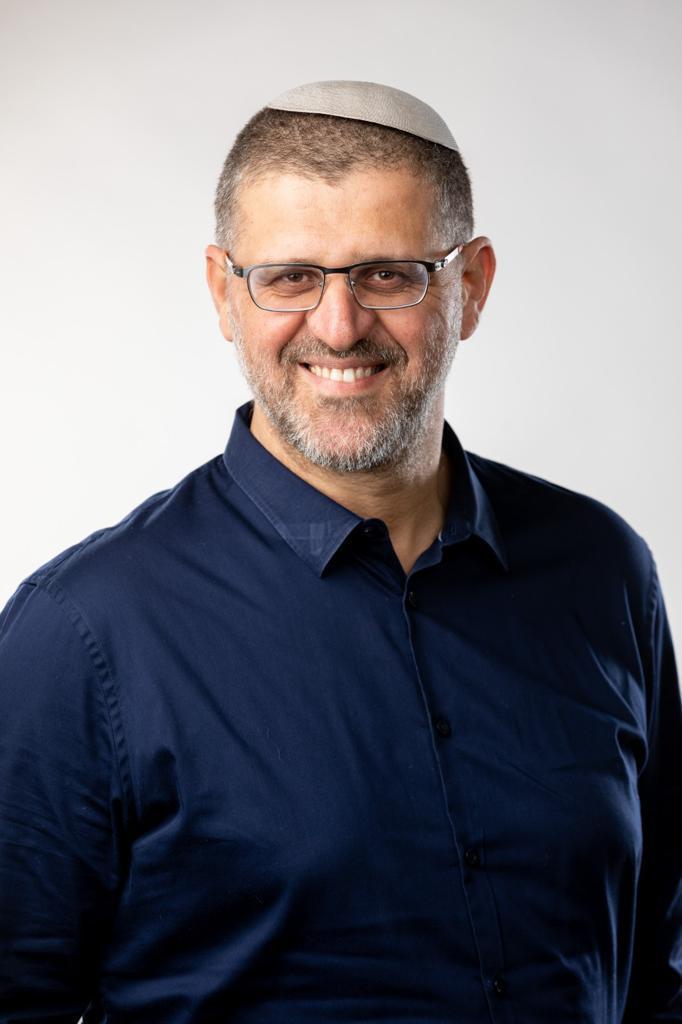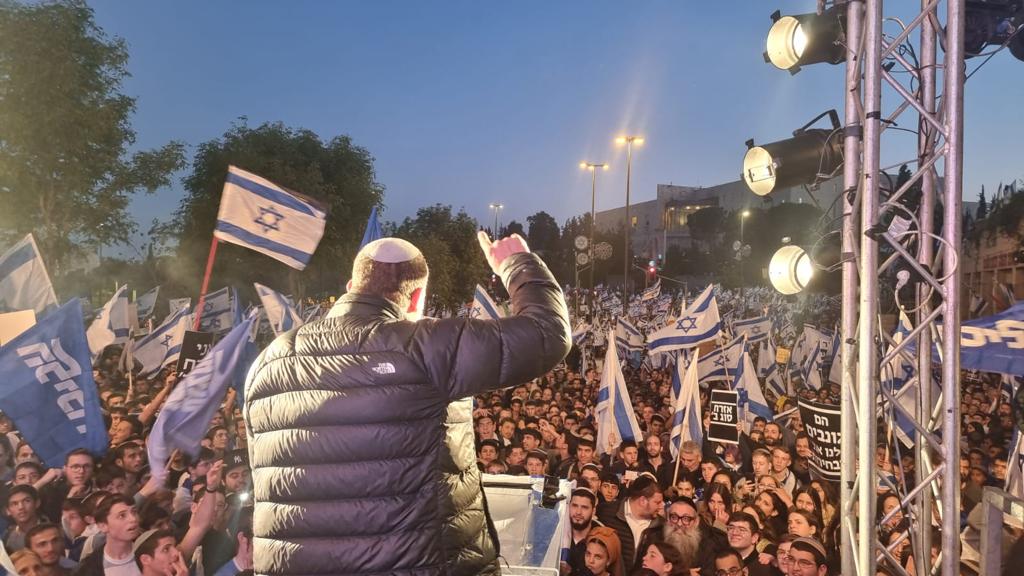The Shortest-Serving Member of Knesset: "I've Always Fought and Will Continue to Fight"
MK Avichai Boaron, a leading figure against home demolitions in Amona, founded a movement to spread Judaism and engages in publishing religious newspapers. Now, he's behind this week's million-person protest, confident: "We've reached decision time; democracy must be returned to the people."
 MK Boaron (Photo: Noam Moskowitz, Knesset Spokesperson's Office)
MK Boaron (Photo: Noam Moskowitz, Knesset Spokesperson's Office)Though MK Avichai Boaron hasn't yet served a month in the Knesset, his voice is increasingly heard on judicial reform and the Jewish spirit wafting through the nation. This week, as Knesset members commemorate memorial and independence days, he's also organizing another day: Thursday, when the 'million-person protest' will be held. This is the right-wing demonstration, which he says will put an end to the rule of the Supreme Court and call on the people to democratically receive what they deserve.
However, while in the Knesset corridors MK Boaron is considered a new figure, in matters concerning the religious settlement activities in Israel, and on the influence of religion over the state, he has considerable experience. A conversation with him about the current state of affairs reveals that he has much to say, and he is unafraid to do so.
The Struggle for Amona
MK Boaron is a lawyer by profession and entered the Knesset at the beginning of the month as the tenth Norwegian MK from the Likud party, after MK Dudi Amsalem was appointed Minister of Justice, thus resigning from the Knesset under the Norwegian Law.
Boaron, married and a father of seven, resides in the Amichai settlement. Born in Netanya, he attributes his true affiliation to Amona, "I was among the founders of Amona in 1996," he recounts, "where I met my wife, where we founded our home and our children were born. We actually lived there until the evacuation in 2006."
During the Amona evacuation, his name first hit the headlines as a leader of the public struggle against demolitions, then leading the fight to prevent the settlement's full evacuation. That struggle lasted until 2016, when the settlement was evacuated, as he charges, "without negotiations with the Prime Minister."
Boaron is clearly dissatisfied with the government's actions at the time, but as he notes, for him and the other Amona residents, it was evident that a replacement settlement would be established, which happened promptly with the founding of 'Amichai,' where Boaron currently lives. "The establishment of Amichai is of great significance," he clarifies, "as it's the first settlement founded in thirty years within the depths of the Shiloh Bloc. The political statement in creating the settlement was very significant – the people of Israel remain in Judea and Samaria forever, and nowadays as there are already 1280 housing units in Amichai, it's more evident than ever."
But the struggle to establish the settlement is just one of the battles MK Boaron has led over the years. He is also recognized as a founder of the 'Maayaney Ha-Yeshuah' movement, which focuses on Jewish outreach and education, and has been publishing the religious magazines 'Pnimiya' for women and 'Otiyot' for children over the last 12 years. "I recognized the great need for quality Jewish journalism that stands in front of the permissive winds that infiltrated the traditional and national-religious public," he explains, "so I took the reins."
 (Photo: Baruch Greenberg, Zion and Jerusalem Forum)
(Photo: Baruch Greenberg, Zion and Jerusalem Forum)"The State of Israel, Where To?"
In the Knesset, Boaron continues this same line of activity, focusing on deepening Jewish identity and settlement, which he sees as part of the mission of strengthening our roots in the ancestral land.
Is this also why you're so active regarding judicial reform?
"If we've reached the topic of judicial reform, it's time to mention what's clear—it's long no longer a reform but a large, central question that can be summed up in three words: 'The State of Israel, Where To?' It's clear to us all that the time has come for Israeli society to form itself and decide whether it will become a state of all its citizens, and even if not a secular state per se, it will be a civic state like other countries, or we will maintain it as a Jewish state that may be traditional, not orthodox, yet Hashem's name will be etched on its forehead, and it's precisely this subject on which the struggle is currently focused.
"This struggle directly influences the liberal and distinctly anti-religious matter of the Supreme Court. Personally, it is clear to me that anyone wishing for a Jewish state must do everything possible to protect the faith of Israel and provide support to our leaders to empower them, so they can advance the reform and change the judges’ appointment committee, thus altering the Supreme Court to finally include national and traditional forces."
MK Boaron emphasizes the dual purpose: "Once we change the judges’ appointment committee, national and traditional forces will finally enter to strengthen the court's views. Additionally, only in this manner can we realize the ability of the people to influence decision-making in Israel. Until now, the situation was absurd—the people mostly voted for certain parties, but in practice, they couldn't pass any law due to the shadow government in the Supreme Court, along with legal advisors essentially binding the ministers' hands under the guise of 'legal' and 'illegal,' deciding what is and isn't allowed, and making substantial decisions on their own. For decades, the tension has grown between the people of Israel and their judges, it’s time to shout 'no more.' We refuse to continue this artificial game where we go to the polls without substantial meaning to the vote we cast. We want to truly influence the state and not settle with the current situation, where there are no real checks and balances, as required from a genuine judicial system."
The Demonstration on the Nature of the State
In essence, do you believe the reform can pass in its original form?
"I think we need to pass it with minimum requirements, but not compromise on key elements that will allow the Israeli government to operate and legislate in a way that expresses the people's will and not the will of Supreme Court judges. This will only happen when the composition of the judges in the Supreme Court changes and only after the judges’ appointment committee is rebuilt. In my view, that is the minimum necessary. Only then will the will of the Israeli people be fulfilled, and the state will be governed according to the people's will, not an elite minority's leading desire."
And what would you say to those who protest every Saturday night?
"I come from the understanding that this is a group of radical leftists shrinking in Israeli society, who want the state to continue in a liberal anti-religious and pluralistic way. To those people, I want to say this: 'We do not disagree with you on the essence of matters. In our opinion, Israel needs to be democratic, ensuring the rights of everyone within, every creation in Hashem's image should have rights. But eventually, one must understand that our state is Jewish, with the name of Israel etched on its forehead. It is not only a technical home for the Jewish people but also carries a Jewish-Israeli spirit in the spiritual sense of things. This is the fabric we must preserve, and this is why we come out to demonstrate.'

Let's talk about the protest you're organizing. Do you genuinely believe a million people will attend?
"The protest on Thursday is primarily to strengthen the leaders and representatives of the national camp in the Knesset and the government pushing for the reform. We chose to hold it outside the Supreme Court to clarify that most of the public does not want its continued dominance and sees it as a dictatorial rule with a group of 15 people from a certain sector imposing itself on the Israeli majority by force. Regarding the number of participants, we're aiming for a million people, but the exact number isn't crucial. Even if 800,000 show up, it won't be a failure but a great success, as the goal is to demonstrate that the clear majority of the national camp is with us, protesting and shouting against the injustice, doing everything possible to resist the attempt to inhibit us from making a significant, much-needed correction in the judicial system.
And how optimistic are you about the success of this initiative?
"I have no doubt it will succeed with the help of Hashem. Everywhere I go, I hear voices saying 'If there is no reform, we won't vote in the next elections.' I see close-up how everyone in the national camp's leadership feels the sincere and genuine expectation of the people to bring change, and as representatives, we must do it. The people sent us to serve in the Knesset and government, and they want to see us push through the reform. Therefore, I am very optimistic. In Hashem's name, we will act and succeed."

